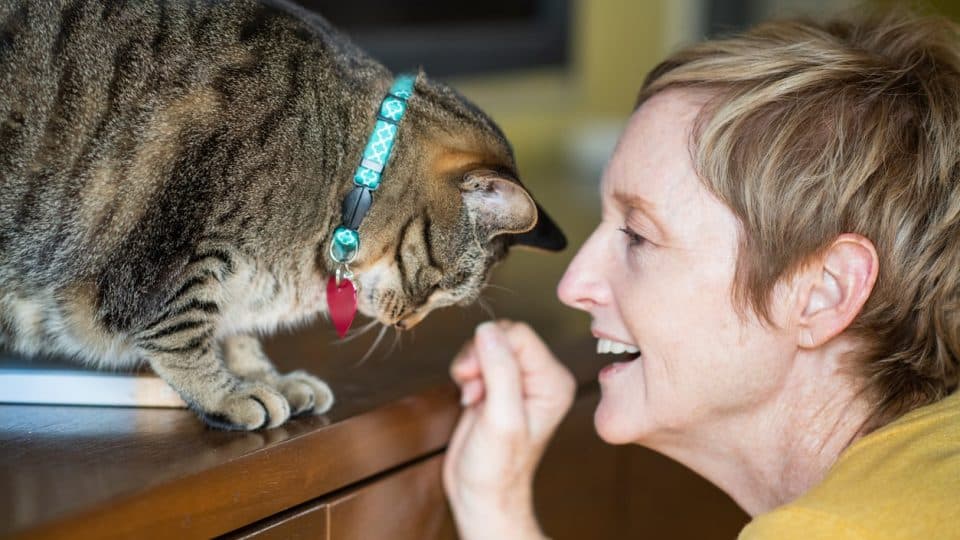Sometimes, between the excitement of choosing your cat’s name and years of saying it, it’s only natural to wonder if cats know their name. Yes, cats do know their name; they may respond with a meow, a head butt, or by running towards you. That said, how your cat chooses to respond to their name is strongly rooted in their personality, biology, and upbringing.
After diving into recent research and consulting feline behaviorists, we’re exploring everything cat names — from recognition to training and the role names play in strengthening the bond between humans and their cats.
Why Is My Cat Ignoring Me?
Just because your cat doesn’t come when called doesn’t necessarily mean they’re ignoring you. Overlooking small nuances of feline body language makes it easy to jump to conclusions that your cat doesn’t know their name. “[Instead] they’re likely responding in more subtle ways,” says Molly DeVoss, Certified Feline Training and Behavior Specialist and founder of Cat Behavior Solutions.
Some cats may eagerly come running at the sound of their name, while others may acknowledge it with a flick of the ear, a shift in body position, or by raising their tail. Age, breed, past experiences, and even your cat’s current mood can all influence how they respond to being called.
If your cat doesn’t respond to their name, a few reasons why might include:
- Their name is too complicated. “Simple names like Cricket are better choices than complex ones like Mr. Cheddar Ball,” says Stephen Quandt, Feline Training and Behavior Specialist and founder of Stephen Quandt Feline Behavior Associates, LLC. Already named your cat? Don’t worry, we’ll cover training tips for existing and new names!
- They don’t recognize your voice. Cats can recognize and are more likely to respond to voices they know and in tones that reflect a positive attitude.
- They don’t associate their name with positive reinforcement. “As long as calling their name is associated with something great, they will respond to it,” DeVoss says.
DeVoss adds that cats did evolve as a solitary species and, therefore, don’t always feel the need to respond to social cues. In other words, your cat might be choosing to ignore you because it’s just their nature to do so.
How to Teach Your Cat Their Name
Cats can learn their name naturally when it’s used again and again, followed by a positive interaction. DeVoss says you can help your cat learn their name by intentionally using it. Say it every time they approach you and quickly reward them with a special treat. This captures their natural behavior (approaching you), adds a verbal cue (their name), and reinforces it with a reward (a treat, pet, or praise).
Ready to teach your cat their name? Here’s Quandt’s 6-step guide:
- If you haven’t yet named your cat, consider a short, simple name (1-2 syllables). Need some inspiration? Check out these popular cat names.
- Sit close to your cat and say their name.
- Just after saying their name (within 1-2 seconds), follow it with a quick “good job” and a treat.
- Repeat this once or twice a day, avoiding distractions at first.
- Gradually phase out treats, substituting playtime or petting as the reward.
- As your cat learns their name, increase the distance between you and your cat or/or practice with more distractions.
Pro tip: Avoid using a disciplined voice or the word “no” when calling your cat’s name. “A lower tone of voice [and] the force of these sounds may startle a cat,” Quandt says.
Why Do Cats Respond to Their Name?
Research indicates that cats pay more attention when hearing their caregiver’s voice over a stranger’s. Beyond perking up for their favorite humans, cats can also interpret emotional meaning from our vocalizations, says Dr. Kristyn Vitale, Ph.D., Certified Applied Animal Behaviorist and Assistant Professor of Animal Health and Behavior at Unity Environmental University.
Interestingly, many people speak to their cats in a different tone than other humans, further building associations between pet parents and their cats. “For example, if you call their name in a sing-song, high-pitched voice, then feed them, they associate that tone of voice with getting something great,” DeVoss says.
So, does this mean bad news for anyone who isn’t in your cat’s inner circle? Not necessarily, but you’ll need to do some work.
“If you want your cat to respond to other people, have them call the cat by name and extend a super special treat,” DeVoss says, “After your cat has accepted the treat from the new person, have them walk across the room and do it again.
How to Tell Your Cat Heard You
Cats’ hearing is about three times sharper than ours, and their ears can swivel independently to pinpoint sounds. So, chances are your cat heard you. They’re just choosing not to respond.
The truth is, it’s not uncommon for cats to be indifferent to us. Due to their solitary instincts, when they’re overstimulated or bored, they might choose to ignore you.
“If you call them at mealtime, you may get a better response than when they’re lightly napping or watching a bird. In other words, it may help if they’re motivated to respond at the moment you call them,” Quandt says.





